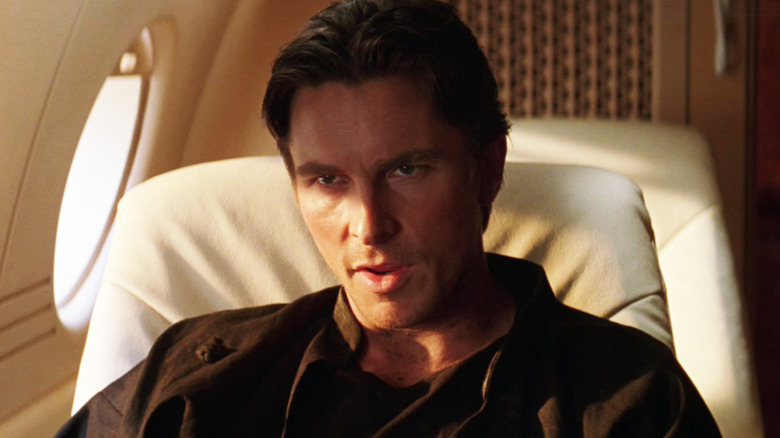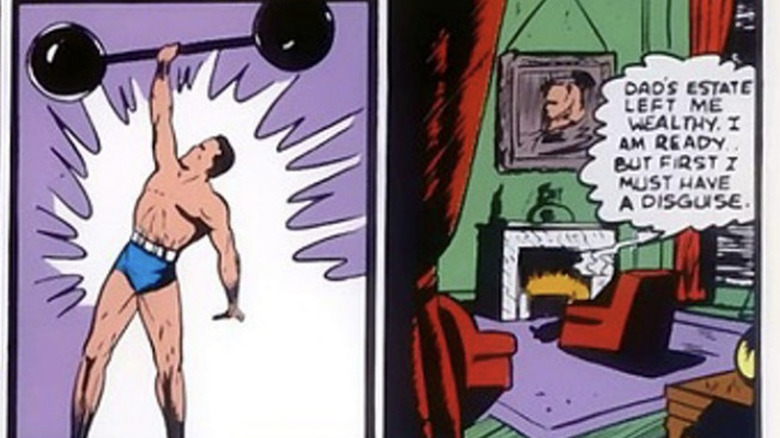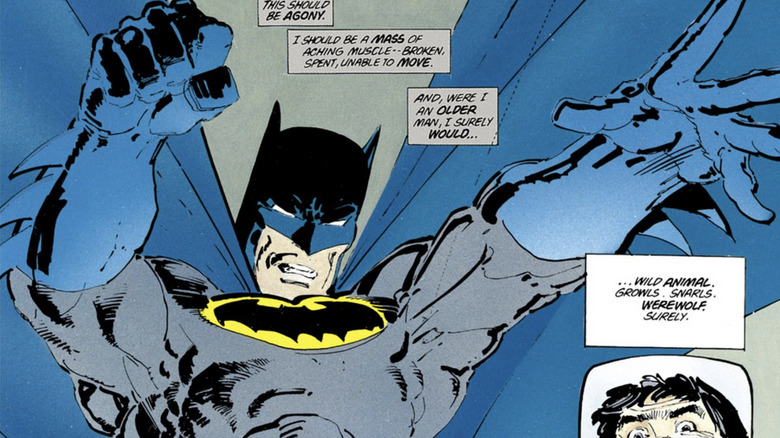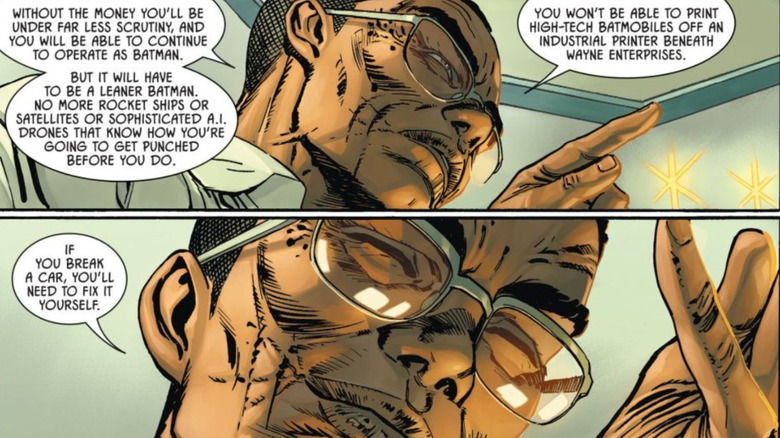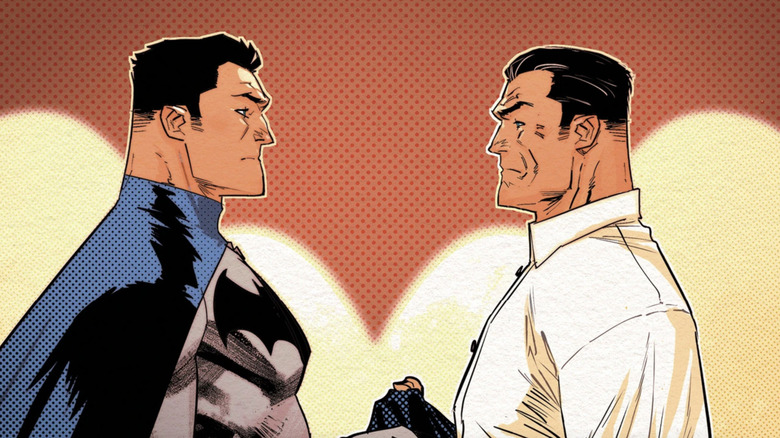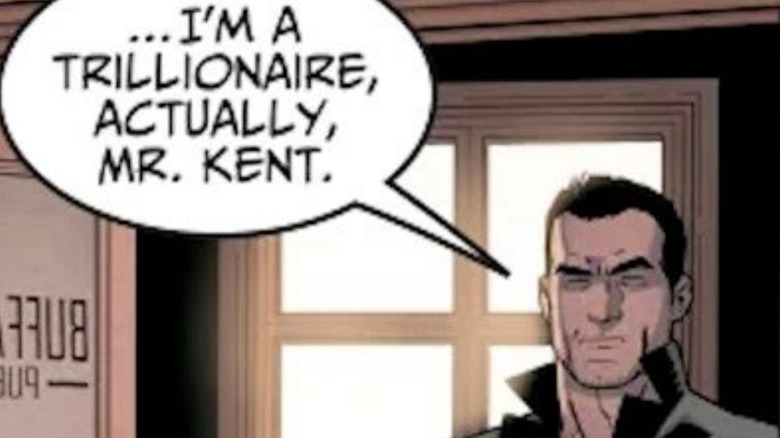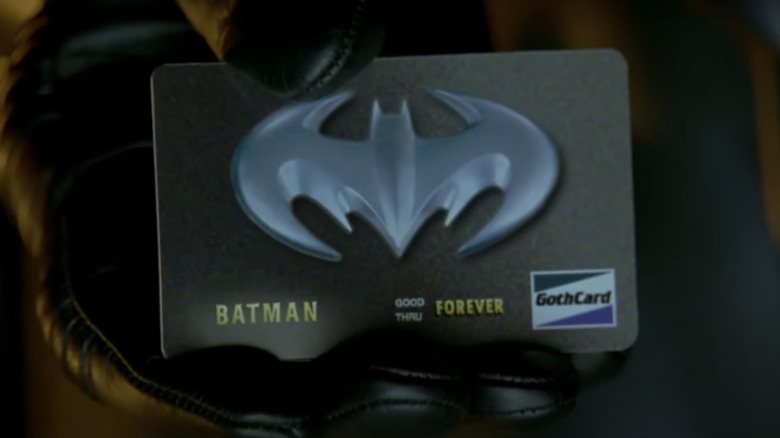Batman: How Much Money Does Bruce Wayne Have?
Bruce Wayne might not technically be a superhero, but his wide range of abilities mean he's essentially a living example of human perfection. His intellect, detective skills, peak physical condition, and expert martial arts talents are all essential components of his ability to wage war on crime as Batman. But you'll often hear it said that his real super power is his wealth. Indeed, Batman would be a far less effective hero than he is if Bruce Wayne were operating out of a one-bed and driving a Prius instead of launching his nocturnal missions from a fully-equipped Batcave beneath a stately manor via some of the most high-tech vehicles in existence. Bruce's wealth is only one part of the Batman enterprise, but it's a pretty important one all the same.
Almost everybody knows the story of Bruce Wayne and his transformation into Batman. Born to wealthy doctor Thomas Wayne and his wife Martha, herself an heiress of one of the wealthiest families in Gotham, Bruce was privileged from the outset — something he's forced to confront in 2022's "The Batman." But he also inherited Wayne Enterprises, a multinational corporation which, in most iterations of the Batman story, he oversees as CEO and chairperson. What many fans might not know, however, is exactly how rich Bruce Wayne actually is.
At the time of writing Elon Musk, the world's richest man, is worth $411 billion followed by Facebook founder Mark Zuckerberg with $241.4 billion. Is Bruce Wayne on the same level as these mega-rich ruling class elites? Well, the answer is a lot more complicated than "yes" or "no." Over the years, Bruce's wealth has changed, with the sole Wayne heir going from "socialite" to billionaire. Here's everything you need to know about Bruce Wayne's fortune and how it's changed since the character was introduced almost 90 years ago.
Bruce Wayne started as a trust fund kid
The Batman movies and modern day comics generally depict Bruce Wayne as a mega-rich member of Gotham's ruling class. But the character didn't actually begin that way. Though he's always been wealthy, Bruce started his literary life in a comparatively humble way. Batman debuted in 1939's "Detective Comics" #27, wherein he's described only as a socialite, with no references to the actual amount of his fortune. When "Detective Comics" #33 delved into the character's origin story, Bruce stated, "Dad's estate left me wealthy," referring to the fortune he inherited after his mother and father were killed on that fateful night in a Gotham alleyway.
Throughout Batman's early years, then, we have no real insight into exactly how well off Bruce Wayne actually was. 1943 was the first time he was described as a millionaire, in "Batman" #19. In that story, Bruce is taken captive with several other millionaires as part of a fiendish plot by none other than that legendary Batman rogue "The collector of millionaires" (his actual name was Ali, to be fair), who is intent upon replacing Gotham's wealthy elite with duplicates that can carry out his evil schemes.
In the mid-40s, Bruce Wayne fell on hard times. "Detective Comics" #105 saw him attempt to finance a motor company only to lose everything due to an employee embezzling funds. This made crime-fighting quite the challenge, with Bruce, Dick Grayson, and Alfred Pennyworth having to scrape together pennies to afford gas for the Batmobile. Thankfully, by the end of that particular issue, Bruce managed to recoup his losses and returned to wealthy status. But we still weren't told exactly how wealthy the man was. All that had been established by this point was that Bruce was a millionaire — a fact reiterated in "The $1,000,000 Star Club!," a story appearing in 1951's "World's Finest Comics" #52.
Bruce Wayne became a billionaire in the '80s and '90s
For the first three decades following his 1939 debut, Bruce Wayne's precise wealth wasn't treated as all that significant by comic book writers. By the end of the '60s we knew the character was a millionaire socialite but the following decade would see writers actually engage with the idea of Bruce requiring significant wealth in order to fund such a big crime-fighting project on his own, especially one that had to be kept secret. As a result, the '70s saw a greater focus on Bruce's finances and how he was able to conceal his identity without anybody following the money trail to his secret identity — an idea that formed part of Christopher Nolan's "The Dark Knight" (which is just as good as you remember). This culminated in the 1979 introduction of Wayne Enterprises. Yes, it took that long for this seemingly integral part of the Batman mythos to arrive. The multinational corporation with dozens of subsidiaries appeared for the first time in "Batman" #307 and allowed Bruce to carry out all manner of furtive financial dealings in order to obscure his vigilante exploits.
This set the stage for Bruce Wayne to level up in the 1980s, a fitting decade for the character to become a billionaire. In Frank Miller's 1986 Batman story "The Dark Knight Returns," a newscaster refers to Bruce as "fifty-five-year-old billionaire Bruce Wayne" following his death. It should be noted, however, that this took place in a standalone future separate from the main comics' timeline, one where Bruce had long since retired from his role as Batman. But it wouldn't take long for other writers, including those behind the seminal "Batman: The Animated Series" to follow suit. Eight years later, Bruce was identified as a billionaire once again in "Batman: Legends of the Dark Knight" #61 (1994) when villain Benjamin Asplin calls Bruce "the Gotham City billionaire." It followed the 1993 release of "Batman: Mask of the Phantasm," which also stated that the animated version of Bruce was worth billions.
That's been the case ever since. Bruce revealed himself as a billionaire even after the "Flashpoint" event resulted in a full reset of the DC Universe with the "New 52." In 2011's "Batman And Robin" #2 Bruce tells Damian Wayne's Robin, "I'm a billionaire Damian, not a trillionaire." There was, however, a brief period where the billionaire lost his fortune entirely.
Some comics place Bruce Wayne's net worth in the hundreds of billions
The story of Bruce Wayne's fortune is one of ever increasing wealth. The character started as a socialite, became a millionaire, and finally a billionaire. Throughout that time, Bruce's exact net worth fluctuated and was never really a set figure even after it was made clear he had billions in the bank. The 2020 comic crossover event "The Joker War," however, clarified that Bruce had amassed $100 billion. That put him up there with some of the real world's richest people. A $100 billion net worth would place him at No. 19 on the current list of real-world billionaires.
Unfortunately for Bruce, the Joker concocted a plan to drain all of the Wayne bank accounts, essentially leaving Batman broke. Of course, this didn't last too long. Batman eventually thwarts Joker's plans in "Joker War," but the authorities decide that Bruce will only receive a share of the recovered Wayne fortune which is wired to Wayne Enterprises CEO Lucius Fox. After this, Bruce is once again able to fund his vigilante efforts, though he's significantly less wealthy than he was when he was at the $100 billion mark.
Speaking to a crowd at CCXP (via The Popverse) "The Joker War" writer James Tynion IV talked about wanting to return Bruce to a time when he wasn't ultra-wealthy. "When you go back to the old stories," he said "[Bruce] wasn't the richest man in the entire world. He was just rich. I knocked him down a few pegs, where he was still doing fine, but it wasn't like, 'I can buy six satellites and build a rocketship tomorrow.'"
The Batman of the comics is a billionaire again
During Chip Zdarsky's "Batman" run, the writer reintroduced the character Batman of Zur-En-Arrh, who takes the form of an alternate personality created by Bruce Wayne as a backup in case his mind is ever lost. Known in the run as "Zur," Batman eventually dispatches his counterpart and takes control of the money Zur had sequestered in several accounts. According to "Batman" (Volume 3) #149 this brought his net worth to $3,120,926,002, making clear that the Bruce of the comics was once again a billionaire. That issue was published in June 2024.
Such a quick fix felt a little too easy, with Bruce essentially regaining his vast wealth through a convenient story addition. Regardless, the Bruce of the comics is once again a billionaire, which for the time being looks unlikely to change.
That doesn't mean there aren't alternative comic books that can make changes to this core element of the character. Scott Snyder's "Absolute Batman" run kicked off in October 2024 and features a notoriously beefed-up Batman. But the comic also features an alternate version of Bruce Wayne as a blue collar engineer who was never born into privilege and lacks the generational wealth of the main timeline Bruce. The series, set in its own "Absolute" universe, depicts Bruce as a working class kid who grew up on the streets of Gotham's Park Row and spends his nights handing out vigilante justice. However much this version of Bruce is worth, it certainly isn't a lot.
Bruce Wayne became a trillionaire in one comic book timeline
If you thought having $100 billion at one point was enough for Bruce, that pales in comparison to the time he became a trillionaire. Imagining such an amount of money is nigh on impossible, but that's how much the character was worth n "Injustice 2, Annual 2," from artist Brian Buccellato and writer Tom Taylor. In this timeline, which ties together the events of the "Injustice: Gods Among Us" tie-in comic and the video game on which it's based, Lex Luthor reveals that he is richer than the country of France. He said as much in "Injustice 2" #4, which debuted in 2017. That same year France had a Gross Domestic Product of $2.589 trillion.
So, when Luthor transferred the entirety of his wealth to Bruce Wayne in "Injustice 2, Annual 2," Bruce almost certainly became a trillionaire. Back in 2014's "Green Arrow" #35 Luthor claimed that if his LexCorp and WayneTech combined, their worth would exceed the U.S. GDP, which at the time was $17.61 trillion. This makes the "Injustice" version of Bruce the richest in the character's history.
How rich are the Batmen of the movies?
According to Forbes' Fictional 15 list from 2012, Bruce Wayne's real-world net worth would have stood at $6.9 billion dollars based on "inheritance" and "defense." The outlet then upped that figure to $9.2 billion in 2013 (which looks to be the last year the Fictional 15 was compiled). Today, that would place him at 340 on Forbes' real-time list of billionaires. How these figures were calculated remains somewhat of a mystery, as does the version of Bruce Wayne to which the outlet is referring, but it's worth bearing in mind.
Over at Centives, however, economics students from Lehigh University actually did the math for a specific version of Bruce Wayne: Christian Bale's iteration from the "Dark Knight" trilogy. They came to the conclusion that Bale's Bruce was worth $11.6 billion, making him the 73rd richest person in the real world at the time. This wasn't some opaque figure plucked from the air, either. It was actually based on comparisons between Wayne Enterprises and real-world companies including shipping firms and General Electric.
There aren't any comparable breakdowns for the other on-screen Bruce Waynes, but judging by the tech wielded by Ben Affleck's Bruce in his DC Extended Universe appearances, he might have the others beat. That said, Michael Keaton's Bruce lived in a version of Wayne Manor that was shot in multiple real-world stately homes over in England, so he certainly wasn't hurting for money. The same can be said for Val Kilmer's Batman, whose H.R. Geiger-designed Bat-vehicles from "Batman Forever" were about as cutting edge as you could get in 1995. Robert Pattinson's Bruce Wayne, meanwhile, is a younger version than the others, which might suggest he's not as accomplished in the business world. That said, his family apparently owned the entire Gotham subway system, which Battinson uses to traverse the city, so that inheritance must have been sizable.
Ultimately, though, George Clooney's Batman had the Batman credit card, so he wins.
